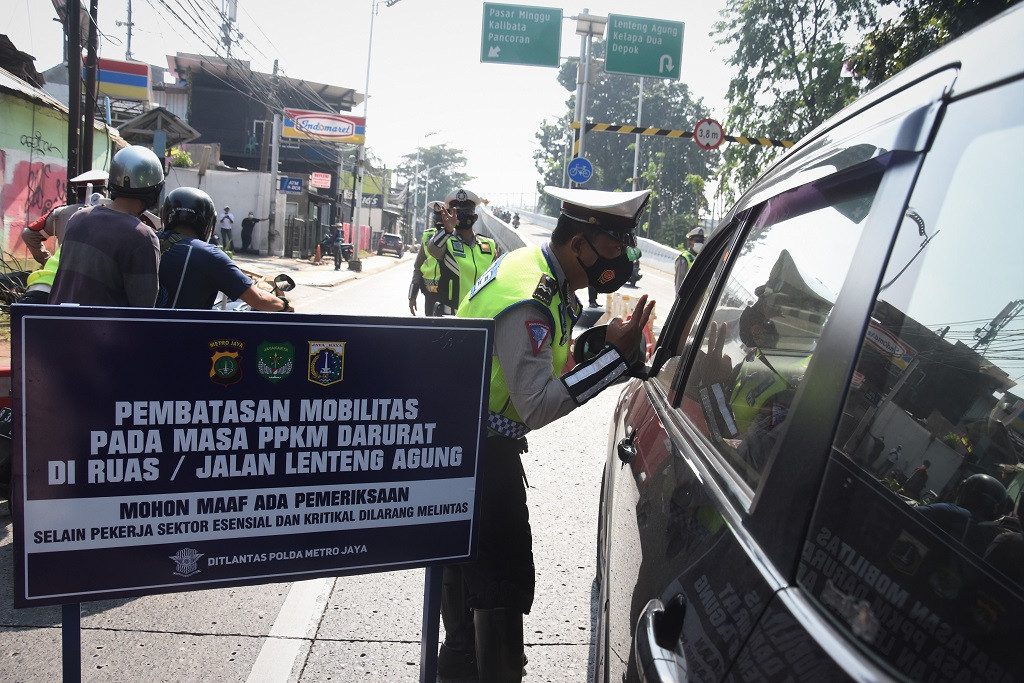Vaccination card, fewer passengers: What you need to know about latest COVID-19 mobility curbs
All intercity and inter-province travelers are required to show proof of at least one vaccine shot and a negative COVID-19 test.
Change Size
 Police officers divert traffic leading to Jakarta at a checkpoint in Jl. Lenteng Agung in South Jakarta on Saturday. The government has imposed emergency public activity restrictions (PPKM Darurat) in Java and Bali from July 3 to 20 to stem the alarming surge of COVID-19 cases. (Antara/Indrianto Eko Suwarso)
Police officers divert traffic leading to Jakarta at a checkpoint in Jl. Lenteng Agung in South Jakarta on Saturday. The government has imposed emergency public activity restrictions (PPKM Darurat) in Java and Bali from July 3 to 20 to stem the alarming surge of COVID-19 cases. (Antara/Indrianto Eko Suwarso)
A
uthorities are imposing stricter mobility curbs during the latest round COVID-19 restrictions, dubbed the emergency public activity restrictions (PPKM Darurat), in an attempt to limit the spread of the disease.
During a virtual press briefing on Friday, Transportation Minister Budi Karya Sumadi announced several restrictions imposed on land, air and sea transportation modes operating in the country’s most populous islands of Java and Bali.
Under the new provisions, intercity and inter-provincial travelers are required to produce a vaccination card showing proof that they have had at least one vaccine shot. They also need to produce negative polymerase chain reaction (PCR) or rapid antigen test results taken 24 or 48 hours before the departure, respectively.
Commuter train passengers traveling within an urban agglomeration will be exempted from the provisions. But public transportation services in Greater Jakarta will have limited operational hours from 4 a.m. to 9 p.m. The Greater Jakarta commuter train service is also limited to 32 percent of total capacity.
Airplanes, ships and intercity trains are allowed to carry passengers up to 70 percent of their maximum capacity. Meanwhile, buses, ferries and local trains are allowed to operate at 50 percent capacity.
Read also: Police block streets on first day of tougher Java-Bali COVID-19 curbs
The ministry gave public transportation operators until Monday to prepare for the new measures.
More than 50,000 police and military personnel will be deployed to help enforce the mobility restrictions and carry out random testing on travelers.
The National Police Traffic Corps have set up around 400 checkpoints across Java and Bali where travelers are required to present the necessary documents.
“We will turn them back should they fail to show the documents,” National Police Traffic Corps chief Insp. Gen. Istiono said on Friday.
In Jakarta, the police have set up 63 checkpoints at several locations to curb intercity and intracity mobility. Among the places are the Senayan and Hotel Indonesia traffic circles in South and Central Jakarta, respectively, as well as toll exits leading to the capital.
The police have also set up checkpoints in Banten, West Java, Yogyakarta, Central Java, East Java and Denpasar, Bali. Istiono said violators would be given a warning and tough punishment, although he stopped short of detailing the sanctions.
The government has imposed the PPKM Darurat in Java and Bali from Saturday to July 20 in an attempt to contain the devastating second wave of COVID-19 infections.
Read also: Fears linger emergency COVID-19 curbs may fall short
The country has confirmed over 20,000 cases daily for the past seven days. On Saturday, the Health Ministry confirmed 27,913 new cases, another record high since the pandemic hit the country in March 2020.
Through the restrictions, the government aims to reduce the daily new cases to below 10,000.









